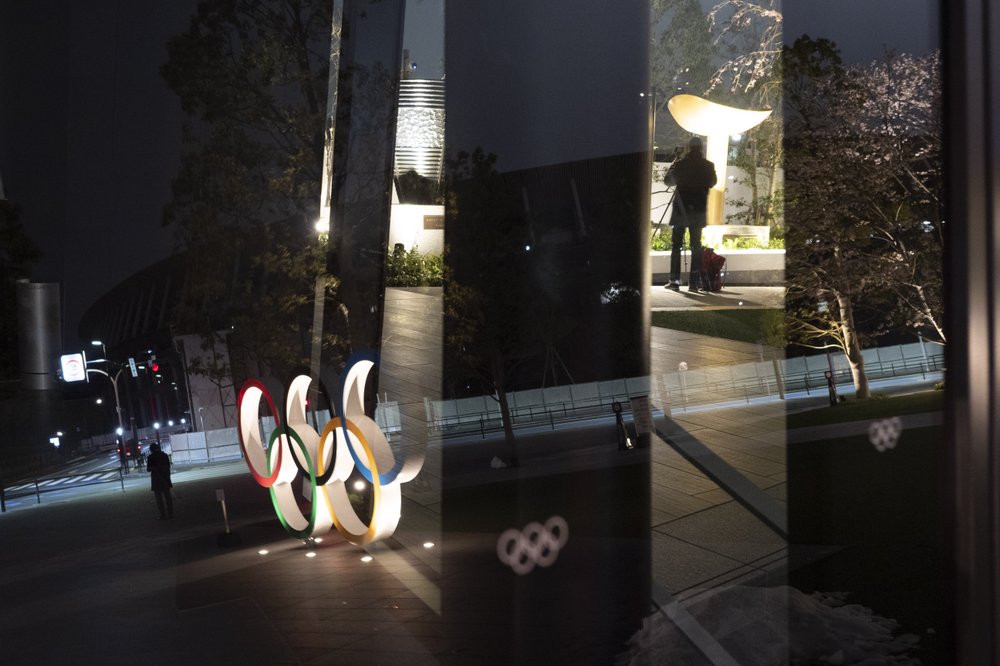
The Olympic rings are reflected on the facade of Japan Olympic Museum Monday, March 30, 2020, in Tokyo. The Tokyo Olympics will open next year in the same time slot scheduled for this year’s games. Tokyo organizers said Monday the opening ceremony will take place on July 23, 2021. (AP Photo/Jae C. Hong)
ROME — Despite some early differences of opinion, the 33 sports that make up the Summer Olympic program voted unanimously on Monday to delay the Tokyo Games by a full year.
Moments later, local organizers and the International Olympic Committee made it official.
“We were the last to express our view. We’re the ones who have problems with the calendar to deal with,” said Francesco Ricci Bitti, president of the Association of Summer Olympic International Federations (ASOIF).
“Two minutes after the end of our call, the press release was issued,” Ricci Bitti told The Associated Press in an interview.
IOC President Thomas Bach held three conference calls before giving the go-ahead to make official the July 23-Aug. 8 dates for 2021.
First, Bach consulted with the local organizers in Tokyo. Then he talked with the IOC’s executive board. The ASOIF — which represents the international track and field, swimming and gymnastics federations as well as every other Summer Games sport — came last.
“We knew last night. … Today the vote was unanimous by the 33 federations,” Ricci Bitti said by phone from Switzerland. “Everyone was convinced that this was the best solution.”
Including NBA, Major League Baseball, golf and tennis players was decisive. So was keeping NBC happy.
Last week, the IOC and Japanese organizers postponed the Olympics until 2021 because of the coronavirus pandemic. That’s when Ricci Bitti became extremely busy, working day and night to get all of the sports involved on the same page.
As a former president of the International Tennis Federation, where he had to deal with sometimes conflicting forces such as the ATP and WTA tours, Ricci Bitti is experienced at getting various factions to form a consensus.
“When we started to discuss it everyone had their own ideas,” Ricci Bitti said, referring to opinions from the triathlon and equestrian federations, which would have preferred holding the games earlier in the year due to concerns over hot weather in Tokyo.
In the end, though, the prospect of placing the games earlier in the year — when many professional athletes would be unavailable — became untenable.
“The biggest reason is participation. For other dates, many sports — especially the professional ones — wouldn’t have had this (availability),” Ricci Bitti said. “There are too many things that coincide.”
He added that “at least six or seven professional sports” wouldn’t guarantee that their athletes would participate if the games were held earlier.
Holding the games in May or June would have allowed track and field and swimming world championships to go ahead as planned next year in July and August — but too many other major sports would have been affected negatively.
“During our opening discussions when some were pushing to have the games earlier, I said no. Because the Tour de France and Wimbledon are too important,” Ricci Bitti said. “Because we were talking about a few weeks earlier. There were a lot of options. There was the spring option, a few weeks earlier, and midsummer. In the end, the summer was the only possible time.
“Everyone has their own problems. We look at it all generally,” he said. “When FINA (the International Swimming Federation) and World Athletics generously proposed to move their events, the problem was mostly resolved.”
While FINA is considering moving its worlds in Fukuoka, Japan, to another period in 2021, World Athletics is delaying its showcase event until 2022.
“This gives our athletes the time they need to get back into training and competition,” World Athletics said. “Everyone needs to be flexible and compromise.”
Another major factor in choosing the dates: The IOC gets 73% of its $5.7 billion income in a four-year Olympic cycle from selling broadcast rights. About half of that TV income is from American network NBC.
“American TV was in agreement,” Ricci Bitti said. “Clearly they were consulted. With the current professional sports calendar, really the only time available is the summer. Otherwise there are too many things going on at the same time.
“The professional calendar is no longer athlete-oriented; it’s business-oriented.”
For the ASOIF, the concern now is what a full-year delay means for its federations’ bottom lines — especially for smaller sports like archery and modern pentathlon.
“Of our 33 federations, 15 to 20 are very dependent on Olympics funding,” Ricci Bitti said. “They’ll get to 2021, but in what condition?”
Overall, though, keeping the dates in the usual end of July-beginning of August period was the only solution.
“Totally. This is what we were working toward,” Ricci Bitti said. “We’re tired. But we’re happy because now it’s decided.”

